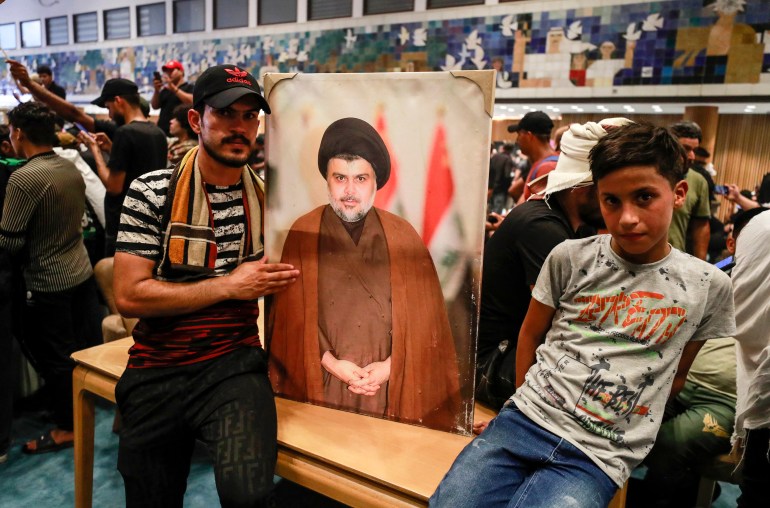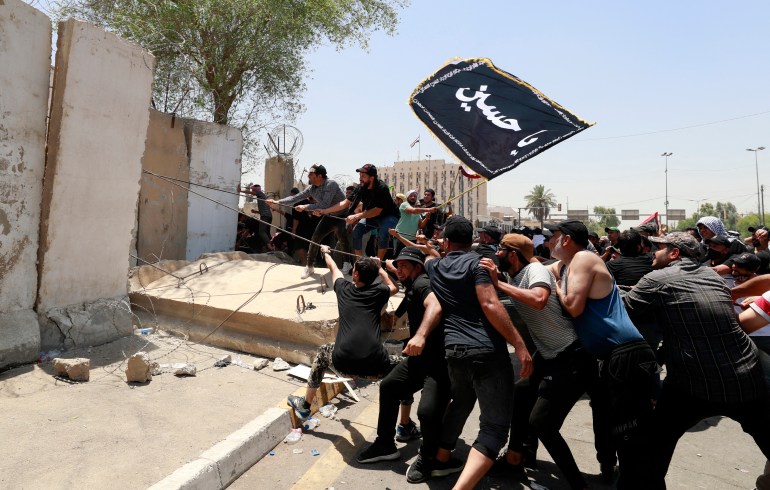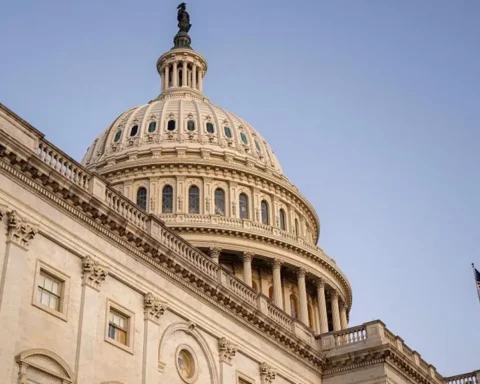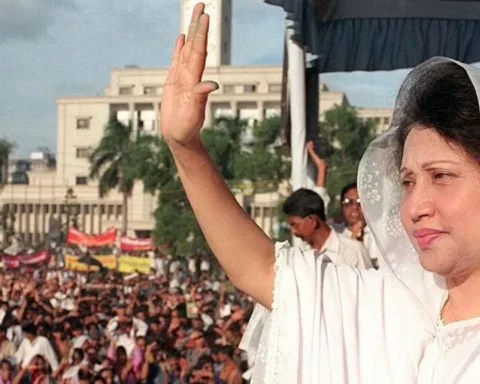Supporters of Shia leader Muqtada al-Sadr occupy parliament to prevent the nomination of a new PM.
Protesters have once again breached Iraq’s parliament in a show of support for influential Shia leader Muqtada al-Sadr, leaving at least 125 people injured and escalating a political stand-off.
Saturday’s demonstration comes days after protesters stormed the legislative body and suspended a session to nominate a new prime minister.
Thousands of supporters rallied by Sadr and his Sadrist Movement tore down concrete barriers Saturday and entered the Green Zone, which houses government departments and foreign missions, before breaking into parliament.
The scenes followed similar protests on Wednesday, although this time at least 125 people – 100 civilians and 25 members of the security forces – were wounded, according to the Ministry of Health.
Sadr’s supporters threw stones and police fired teargas and stun grenades.
“We are calling for a government free from corruption… and those are the demands of the people,” one protester, Abu Foad, said among crowds of protesters carrying placards with Sadr’s photograph and national flags.
The media office of Prime Minister Mustafa al-Kadhimi had issued a statement calling on security officers to guarantee the safety of state institutions.

Al Jazeera’s Mahmoud Abdelwahed, reporting from Baghdad, said that supports of Sadr “are now in full control of the headquarters of the parliament.
“What’s new this time is that they’re not planning to leave, until as they say, their demands are met,” Abdelwahed said.
Demonstrators oppose the candidacy of Mohammed Shia al-Sudani, a former minister and ex-provincial governor, who is the pro-Iran Coordination Framework’s pick for the premier’s post.
A vote heralding al-Sudani to the post of prime minister was scheduled to take place on Saturday, but the session was suspended after Wednesday’s events.
“They do not want parliament to accept al-Sudani… they believe [he] is a replica of Nouri al-Maliki, the former prime minister, whom they accuse of corruption,” Abdelwahed said. “Many of them accuse him of ruining the country for two terms when he was prime minister.
“[Protesters] wanted to storm the headquarters of the Supreme Judiciary Council, but they were instructed by one of the aides of al-Sadr at the last moment to back off, to keep it peaceful and keep it quiet.
“Despite all of these calls from politicians to keep it peaceful, to refrain from violence, it has been very chaotic and disorganised… the situation remains very tense,” Abdelwahed said.
Al-Sadr’s bloc emerged from elections in October as the biggest parliamentary faction but still fell far short of a majority.
Ten months on, the deadlock persists over the establishment of a new government – the longest period since the 2003 invasion by the United States reset the political order in the oil-rich country.

Al Jazeera’s Dorsa Jabbari said people are demanding change. “They don’t want the previous corrupt politicians to stay in power, they don’t want the country to have any [interference] by the United States and Iran,” the reporter said, speaking from inside the occupied parliament.
“We are here for a revolution,” protester Haydar al-Lami said.
“We don’t want the corrupt, we don’t want those who have been in power to return … since 2003… they have only brought us harm.”
Although al-Sadr’s alliance won the most seats in October’s parliamentary election, squabbling political parties failed to reach the two-thirds majority needed to pick a president – an important step before a prime minister can be selected.
After the negotiations stalled, al-Sadr withdrew his bloc from parliament and announced he was exiting talks on forming a government.






